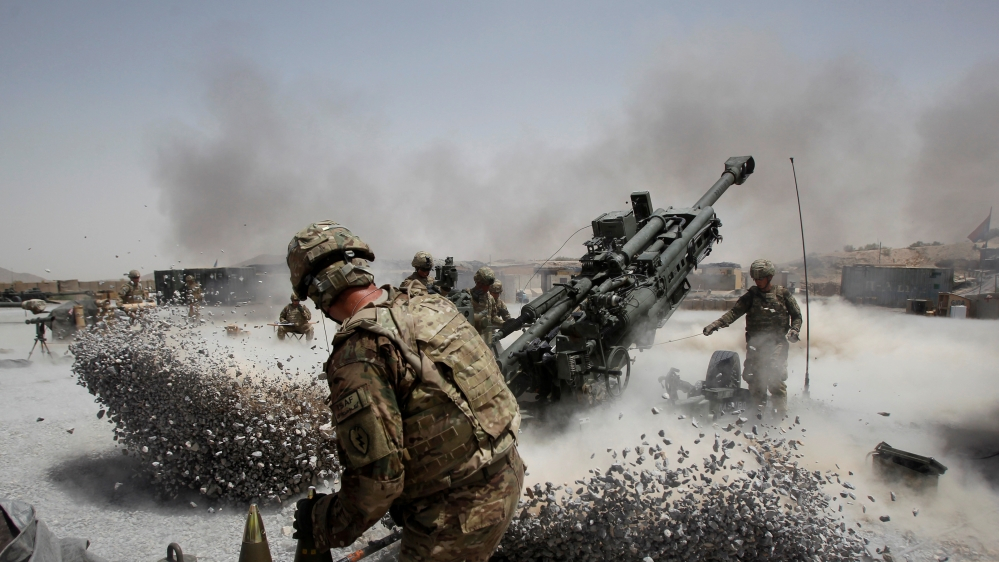By Eddie McCabe
US imperialism’s 20-year war in Afghanistan has come to an ignominious end with the final withdrawal of its 2,500 remaining troops this month.
The withdrawal comes two months before Biden’s deadline of 11 September — the 20th anniversary of Al-Qaeda’s criminal mass terror attacks on the twin towers in New York. This reactionary terror group, and the Taliban regime it had connections with, were the offspring of US foreign policy.
Both grew out of the Islamic fundamentalist Mujahedeen in the 1980s, which was financed and armed by the United States, as well as US allies in the Pakistani and Saudi regimes, to fight the Soviet army that had invaded Afghanistan in 1979. The mastermind of the 9/11 attacks, Osama Bin Laden, who fought in this war, described the nature of this backing:
“…I set up my first camp where these volunteers were trained by Pakistani and American officers. The weapons were supplied by the Americans, the money by the Saudis.”
The Taliban, which emerged from the chaos that surrounded the Soviet withdrawal in 1989, was helped to power by the Pakistani intelligence agency, ISI, in 1996. The latter hoped to establish a client state in Afghanistan to bolster its power in the region, particularly in its conflict with India.
A failed war
If the initial aim of US imperialism in waging war in Afghanistan in 2001 was to rid it of the Taliban and put in place a more pliant government, 20 years on it has demonstratively failed in that objective. The Taliban is quickly gaining ground once again and now claim to control 85% of the country.
The war and occupation of Afghanistan have only added to the horrors inflicted on its people. The Presidencies of George W. Bush, Barack Obama, Donald Trump, and their allies in NATO have relentlessly persisted in this bloody war and occupation which has resulted in the deaths of an estimated 175,000 Afghans. Over the last two decades it was a laboratory for new deadly weapons of war, notably the use of drone strikes. One report described the impact of these attacks on the residents of one Afghan village:
“ [they are] haunted by American drone strikes for years and that their fate is often ignored by both the U.S. military and the Afghan government in Kabul. “They keep saying that they are killing terrorists. But that’s not true. Farmers, shepherds, and women are not terrorists. One of the victims, Naqib Jan, was a 2-year-old child,” said Khan, who works as a teacher in a local village. During the last months and years, several relatives and members of his family were killed by drone strikes. He claims that his fellow tribesmen are terrified and depressed, suffering from trauma, and that many children fear to play outside”
Regime of torture
Alongside imperialist atrocities and destruction, torture also became commonplace in Afghanistan, notoriously so in Bagram Air Base in Kabul, from which US forces recently departed. It was here that prisoners detained by US forces reported being:
“held in detention for weeks, continuously shackled, intentionally kept awake for extended periods of time, and forced to kneel or stand in painful positions for extended periods. Some say they were kicked and beaten when arrested, or later as part of efforts to keep them awake. Some say they were doused with freezing water in the winter.”
Such treatment would be faced by prisoners in Iraq and others randomly detained as part of the “war on terror”. In the weeks following the invasion of Afghanistan the first detainees arrived in Guantanamo Bay, the US base in Cuba. The image of prisoners in orange jumpsuits, confined in small cages, often in perpetuity, summed up the callous disregard for human rights of the Bush administration and its successors.
The attacks of 9/11 became the pretext for the Bush administration to launch its “war on terror” — the opening salvos of which began in Afghanistan, which was invaded the following month. After the quick deposing of the Taliban regime, the war-mongering hawks, notably the recently deceased Donald Rumsfeld and Vice-President Dick Cheney, and the cabal of neoconservative “intellectuals” surrounding them, such as Paul Wolfowitz, set their sights on Iraq.
Unfettered power
In the late 1990s, these neo-conservative ideologues began to coalesce in think tanks such as the “Project for an American Century”, arguing that in the era following the end of the Cold War and collapse of Stalinism, that all barriers, or perceived barriers, facing US imperialism needed to be removed. The war in Afghanistan flowed from the immediate necessity of restoring the prestige of US imperialism after the attack on the Twin Towers, but more broadly it was quickly weaponised to enable the neoconservatives to put into practice their fantasies of unfettered global domination.
This took the form of wars for “regime change”, most notably in Iraq. They would bring untold misery to the Iraqi people and to the wider region, the consequences of which are still evident today and will be for years to come. For the world’s largest military power, these wars have largely proven to be disasters and the imperial hubris of the Bush administration seems to be little more than a bitter memory. As the Socialist Party and International Socialist Alternative (then called the Committee for a Workers’ International) predicted, the limitations of the power of US imperialism proved to be all too real.
War—an institution of capitalism
Wars and political instability are only some of the problems faced by capitalism today. Twenty years on and economic and ecological crises, both in the form of the pandemic and climate change, now dominate.
With Orwellian irony, the war and invasion of Afghanistan was named “Operation Enduring Freedom” in 2001. Few Afghans will consider themselves free, or secure in any way, and certainly not due to this two-decades-long imperialist adventure which has now come to an end. The words of the Roman historian Tacticus when describing the wars of imperial Rome come to mind, “they make a desert and call it peace”. Naturally, many Afghans will look with a sense of foreboding at the prospect of the Taliban reasserting its oppressive rule, or with Afghanistan descending into a more prolonged civil war.
War is an institution of capitalism and imperialism, a continuation of its systematic desire to exploit the world at the expense of the working and poor masses. This bloody system must go and be replaced with a socialist world, where natural and economic resources are publicly owned, democratically controlled and planned by the working class and the oppressed. This is the only material foundation upon which a society of harmony, peace, and justice can be built.












